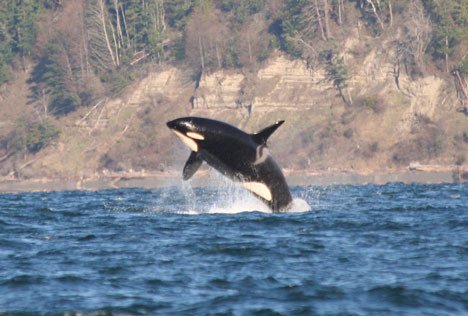Drifting with the breeze in a boat off Mutiny Bay, Jill Hein waits with her camera at the ready. It is a clear December afternoon on the west side of Whidbey Island, and the Coupeville grandmother is in for the thrill of a lifetime: more than 40 orcas.
Puget Sound’s Southern Resident Orcas are on the move, and suddenly are all around Hein’s boat, breaching, flipping and rolling. It is a sight Hein hopes will thrill her own grandchildren many years from now. But she worries that because of rapid changes in the world’s oceans, orcas will be long gone from the planet.
Two years ago and half-a-world away, a Norwegian school teacher, Sven Huseby, read a magazine article and wondered the same thing.
The son of a commercial fisherman, Huseby set out on a personal journey to learn why the world’s seas are becoming more acidic and dissolving the shells of many ocean-dwelling creatures, threatening the entire marine food chain. He and his film-director wife, Barbara Ettinger, reached the staggering conclusion that their own grandson could grow up in a world without fish.
Together, Huseby and Ettinger produced “A Sea Change,” a feature-length documentary that has won worldwide acclaim and top prizes in international competition. Island County Marine Resources Committee will sponsor a free public showing at 7 p.m. on the evening of Sound Waters University, Saturday, Feb. 6, in Fellowship Hall at Coupeville United Methodist Church. The church is located at 608 N. Main St.
On hand to introduce the film and lead a discussion afterwards will be Dr. Richard Feely of the University of Washington and the National Oceanographic and Atmospheric Administration. Feely, of Seattle, is an expert on ocean acidity and one of the scientists quoted in the film.


